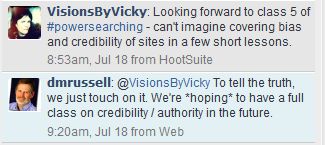Power Searching with Google – Class 5
 Checking Your Facts
Checking Your Facts
I was really looking forward to this class because how to assess credibility and bias are big issues with my students. They are of the “if it’s in the top results it must be the best site” mind. Before I even ventured into this class, I tweeted about it and Dan Russell replied:
 I was still very interested in how the search experts would approach this topic and would definitely love a full class on it in the future.
I was still very interested in how the search experts would approach this topic and would definitely love a full class on it in the future.
- I liked the first video as an overview of what search results really mean and need to get my students to understand that the ranking of a site does not equate to its credibility.
- I have used the All About Explorers site for lessons on credibility and have found some variant data involved while using it. For example, in the John Cabot Treasure Hunt my students found that they had a hard time finding out exactly when and where John Cabot died.
- Good points in the second video about not searching for the things that you think you already know. Teaching students how to frame their search is so important.
- Interesting idea to use the date range options to look at the validity of quotes. This would also have to lead to other credibility ideas since dates can be spoofed on servers or can just be wrong for some reason. Also, you would need to be sure to verify the validity of the site also.
- Using WHOIS to look up who owns a site is a good idea for students to use and be aware of however there seemed to be a problem with this lesson since it was stated that the name server owns the company and this isn’t true; they merely host the site. In the example given, Johnson & Johnson probably does own Splenda but that’s not always the case.
Things I wondered about during this class:
- Are extra words really bad in searches? Any time I do search classes or read search hints I find that I include more words than is recommended as the best way. I don’t type sentences or questions but I do include more than the minimum. How bad is that really?
- Since not all books are scanned, searching books doesn’t necessarily mean that what you’re looking for doesn’t exist. It just doesn’t exist (yet) on Google. How do I get my students to use searching within books when appropriate but to realize that it may not be the definitive answer?
- Why was there no mention of finding a site author and checking their credibility through additional searches. This is a skill I feel is really important for my students to use.
Are you teaching search skills to your students? What kinds of activities or lessons are you doing with your students to address credibility of sites and bias on sites?
Leave a Reply